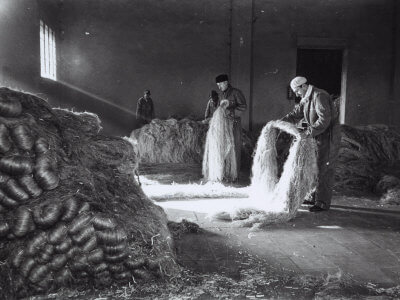Hemp History
2 Hemp is one of the oldest agricultural crops, cultivated as early as 4000 B.C. in China. It has been mentioned in different contexts in several ancient texts:
Hemp is one of the oldest agricultural crops, cultivated as early as 4000 B.C. in China. It has been mentioned in different contexts in several ancient texts:
- It was grown all over the world and valued for its medicinal benefits.
- Once its many properties were discovered, it was treated as a precious substance and even given importance in religious ceremonies.
- Hemp is one of the oldest known sources for cloth
- Composites of hemp and limestone have been discovered in ancient Roman structures.
The naval prominence in the Netherlands around the 17th century brought about the Golden Age. The Dutch East India Company has established their shipping trade globally, with the financial support of the Dutch merchant empire. This naval industry relied on hemp to a very large extent. It was the second most important component in ship-building, after wood. It was used as rope, canvas and to waterproof the hull through caulking. Around 21 kilometers / 13 miles of rope and several hundred square meters / yards of canvas were needed for each sailing vessel. This in turn increased the cultivation of the cannabis plant.
The British colonized the region of modern-day America and set up large agricultural fields to produce the raw material, mainly in Kentucky and Missouri. The processed fibers were exported to England and the other colonists. Employment opportunities increased in America as the spinning and weaving industry grew, eventually leading to the War of Independence against England’s dominance. The growth of hemp in the U.S. dwindled with the availability of cheaper imported fibers from Manila and the East India Company. During War II, however, the Japanese took possession of the Philippines and the East India Company, and since jute supply from India was also restricted, the Americans had to produce hemp once again, for industrial purposes as well as to sustain the vast demand from the army and navy, as follows:
- Rope made from hemp was used in rigging, towing and mooring the ships
- Paratroopers needed webbing for their parachutes
- The fiber was used to make shoes for the soldiers
- It served as a fire-hose of average quality
Thus, hemp has played a vital role in global history.
“Hemp for Victory” Documentary from 1942.

 Dr. Bronner's Magic Soaps Pure-Castile Soap
Dr. Bronner's Magic Soaps Pure-Castile Soap Nutiva Organic Hemp Protein
Nutiva Organic Hemp Protein
Love this video and the history of hemp. Thanks for sharing and teaching people about industrial hemp.
Quality content is the secret to invite the users to visit
the site, that’s what this site is providing.